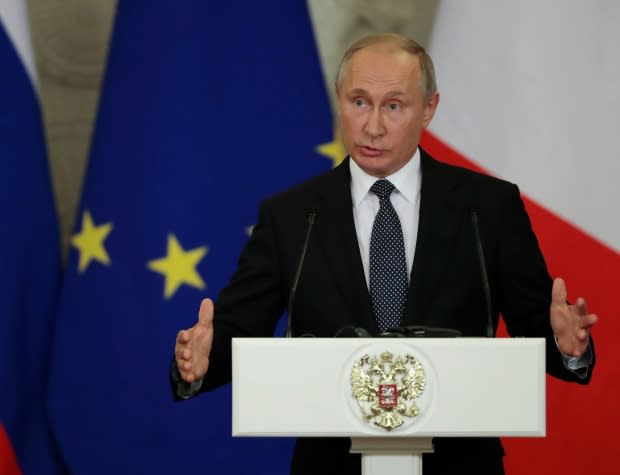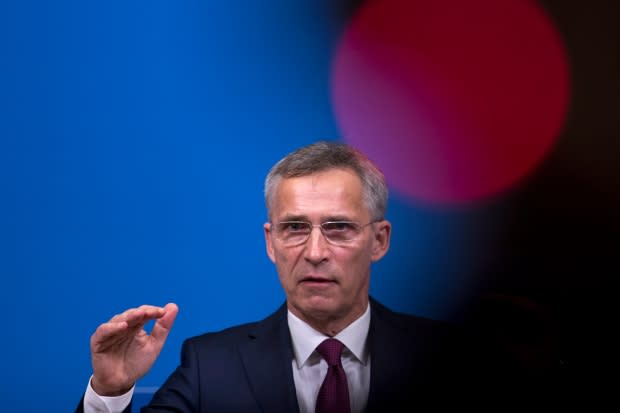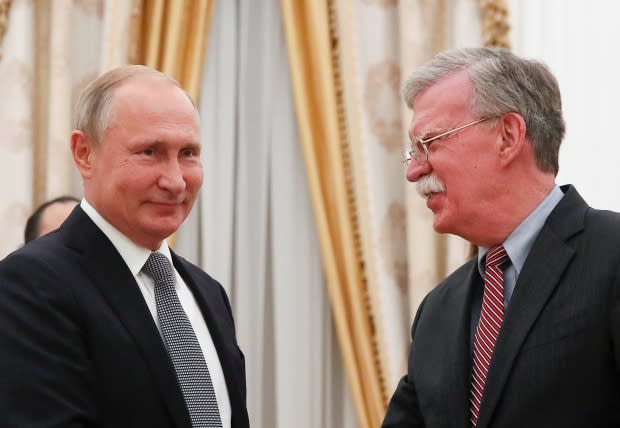Putin says if Trump deploys missiles in Europe, Russia would target host countries
Russian President Vladimir Putin says the deployment of U.S. intermediate-range missiles in Europe would force Russia to target the nations hosting them.
Putin's warning on Wednesday followed U.S. President Donald Trump's weekend announcement that he intends to opt out of a landmark nuclear arms control pact over alleged Russian violations.
The United States insists that Russia's 9M729 missile system contravenes the 1987 Intermediate-Range Nuclear Forces Treaty, and NATO allies agree that is probably the case. The pact between Moscow and Washington bans an entire class of weapons - all land-based cruise and ballistic missiles with a range from 500 to 5,500 kilometres.
Experts say the Russian system would operate at lower altitudes, making it tough to bring down. It could also reach targets across Europe and even the U.S. West Coast if stationed in Siberia.
Putin rejects Trump's claim that Russia breached the treaty and alleges it's the United States that violated the agreement.
Putin says he hopes to discuss the issue with Trump in Paris on the sideline of Nov. 11 events marking 100 years since Armistice Day.

Earlier Wednesday, NATO secretary general Jens Stoltenberg said he does not expect a nuclear buildup in Europe even as tensions rise between the U.S. and Russia over the pact.
Despite concerns about its capabilities, Stoltenberg said he does not "foresee that allies will deploy more nuclear weapons in Europe as a response to the new Russian missile." But he added that the 29 nations in the world's biggest military alliance are assessing "the implications of the new Russian missile for our security."
"We don't want a new Cold War. We don't want a new arms race," he said at a news conference announcing the start of NATO's biggest military exercises since that era of tensions ended in 1991.
The Trident Juncture manoeuvres in Norway that shares a border with Russia will involve around 50,000 personnel, 65 ships, 250 aircraft and 10,000 vehicles. The hypothetical scenario involves restoring Norway's sovereignty after an attack by a "fictitious aggressor."
The NATO war games come weeks after Russia held its biggest post-Cold War military exercises, in co-operation with China.

Russian Defence Minister Sergei Shoigu said Wednesday the increased NATO military activities near Russia's western border will force it to take countermeasures.
"NATO's military activities near our borders have reached the highest level since the Cold War times," he said, noting that NATO allies are engaged war games "simulating offensive military action."
U.S. in compliance of treaty: Stoltenberg
Speaking on a trip to Belarus, Russia's ex-Soviet neighbour and current ally, Shoigu warned that Poland's plan to permanently host a U.S. army division would affect regional stability and trigger a Russian response. He warned that Moscow will have to "take retaliatory measures to neutralize possible military threats."
Russia-West relations have sunk to a new low since Russia's 2014 annexation of Ukraine's Crimean peninsula and its support for a separatist insurgency in Eastern Ukraine.
Fresh doubts about the INF treaty are a stark reminder of the way tensions between NATO allies and Russia soared in the 1980s during the so-called Euromissiles crisis, when the United States deployed cruise missiles in Europe to counterbalance a perceived threat from Russia's SS-20 nuclear warheads.

The European Union has urged both the United States and Russia to uphold the INF treaty, saying the pact is one of the cornerstones of European security. But Stoltenberg stopped short of calling on Washington, the biggest and most influential NATO member, to stay in the treaty.
"The INF is a landmark treaty, but the problem is that no treaty can be effective, can work, if it's only respected by one part," he told reporters in Brussels, noting the "U.S. is in full compliance."
He said that, based on U.S. estimates and Russia's reluctance to discuss the missile system with NATO, "the most plausible explanation is that Russia is in violation of the treaty."
Still, a U.S. exit from the INF treaty would put another strain on NATO allies already shaken by Trump's demands for higher defence spending by the Europeans.
At a NATO summit in the summer, all 29 allies, including the United States, reasserted they were "fully committed to the preservation of this landmark arms control treaty."

